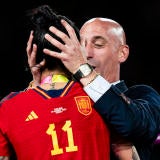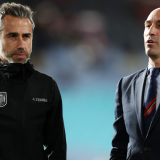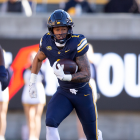
Spain's historic Women's World Cup win has been followed by a series of tumultuous days for the Royal Spanish Football Federation and its president, Luis Rubiales.
He thrust himself into the headlines for all the wrong reasons during the trophy ceremony in Sydney, Australia, where he forcibly kissed player Jennifer Hermoso just before she received her winners' medal. The days since have delivered wave after wave of storylines as criticism of Rubiales and calls to resign pour in, the federation botches one attempt after the next to save face, the president and his allies grow increasingly defiant, and an overwhelming amount of support for Hermoso arrives from all around the world.
This is undoubtedly one of the biggest controversies in the history of Spanish soccer and is all the more jarring because it came directly after one of the country's biggest sporting triumphs. Rubiales, though, has been no stranger to controversy during his spell in charge of the federation.
Here's what to know:
Who is Luis Rubiales?
Before his days as a high-ranking soccer official, Rubiales was a professional player from 1997 to 2009. The defender mostly played in Spain's lower leagues but competed in La Liga for two seasons with Levante and also played three games for Scottish side Hamilton Academical before suddenly announcing his retirement at 32.
A few short months after he announced his retirement, he became the president of the Association of Spanish Footballers in March 2010. He quit his role as the head of the players' union in November 2017 to run for president of the federation and won the role in May 2018.
He has slowly but surely developed a pattern of alleged inappropriate behavior over the last year, most notably when his uncle and former federation employee Juan accused Rubiales of embezzling money. His uncle told anti-corruption officials that Rubiales used federation funds to host a "party" in Andalusia and invited "eight to 10 young girls," per The Athletic. Rubiales said it was strictly a work gathering.
Controversy with the women's team
Rubiales and the federation have been in tension with Spain's women's national team since before the World Cup triumph. In September 2022, 15 players sent separate but identical emails refusing to play for the national team until the federation made changes. The players, including World Cup golden ball winner Aitana Bonmati, complained of a lack of professionalism and a toxic culture. The federation reportedly did not pay for the team to have enough support staff, nor did it foot the bill for sufficient travel arrangements. Head coach Jorge Vilda and his staff also reportedly denied players privacy during training camps, forcing them to keep their hotel rooms open and inspecting their bags after they went on excursions.
The federation responded by criticizing the players who protested, and the organization's head of women's soccer Ana Alvarez said "the federation comes first." The federation also backed Vilda to continue without the players, who were asked to apologize if they wanted to return to the team. Rubiales then skipped the Women's Supercopa in January 2023, which meant players had to pick up their own winners' medals instead of receiving them during a post-match ceremony that would include local soccer dignitaries.
Rubiales treated the World Cup-winning run as justification for his actions, despite the fact that several players continued to protest the federation. After the semifinal win over Sweden, he said Vilda has "forgotten the people … who wanted to destroy him," and the official account for the women's team acted as Rubiales' mouthpiece with a post that read "Vilda in" on social media after the final.
Post-World Cup misconduct
The conflict reached new lows after Rubiales forcibly kissed Hermoso, though. He initially described criticism of his inappropriate behavior as "idiocy" and cracked a joke in the locker room saying he would marry Hermoso in Ibiza to celebrate the World Cup victory. He continued to earn criticism for his actions, and then he and the federation began a days-long campaign to clean up his image.
The federation issued a statement on Hermoso's behalf soon after the forced kiss, describing it as a "mutual gesture." The federation did not run the comment by Hermoso before publishing it and she eventually denied that the kiss was consensual in a statement issued by her agency and union.
Rubiales was expected to resign five days after the incident, but instead was defiant and infamously gave a speech in front of his allies at an emergency meeting convened by the federation. He alleged Hermoso was the one who kissed him, blamed "false feminism" for putting him in this situation, and said he would take legal action against the government and the players. The federation's spokespeople continued to serve as his mouthpiece following the speech, issuing factually inaccurate statements accusing Hermoso of wrongdoing.
The response
Rubiales was swiftly criticized following the forced kiss, and condemnation continued after his apology failed to convince. Spain's acting prime minister Pedro Sanchez said the apology "wasn't adequate," while acting second deputy minister Yolanda Diaz was one of the first of many who asked him to resign. U.S. women's national team star Megan Rapinoe, meanwhile, said the incident " signals such a deep level of misogyny and sexism in that federation and in that man." FIFA finally stepped in four days after the final when its disciplinary committee opened up proceedings against Rubiales.
After Rubiales refused to resign, the criticism hit a new level. More than 80 Spanish women players, including the entire World Cup-winning team, are refusing to play for the team as long as Rubiales remains in charge, while the entire support staff for the women's senior and youth teams resigned. The women that made up the support staff also accused Rubiales of making them sit in the front row of his speech to improve his look.
FIFA also suspended Rubiales for 90 days, while Sevilla wore warm-up shirts supporting Hermoso before their La Liga match that weekend. Hundreds of people also backed Hermoso in a protest in Madrid the following week. The federation also issued a statement on behalf of several Spanish soccer officials asking Rubiales to resign.
Some of Rubiales' allies continue to dig their heels in, namely his mother, who said she is on a hunger strike on his behalf. Most of them continue to earn criticism, including from Diaz, who said they "should not continue in their positions," per DAZN. That includes Vilda, who himself is now facing increased calls to resign.
What's next?
FIFA's suspension means Rubiales cannot take part in any official duties, including his role as UEFA vice president. He has been banned from contacting Hermoso "or her close environment," and the same is true for federation employees and others working on Rubiales' behalf. FIFA has the ability to suspend Rubiales for a longer period of time and power to issue lifetime bans, but a decision will likely only be made following the disciplinary proceeding.
Spanish prosecutors also opened up an investigation into Rubiales to decide whether or not he should be charged with the crime of sexual assault and have reportedly asked Hermoso to participate in their probe, per Guillem Balague. The High Council of Sport, meanwhile, presented evidence to the country's Court of Arbitration for Sport, which has the power to suspend Rubiales. The court ruled Friday that Rubiales committed a "serious offense" rather than a "very serious offense," per Balague, which means the federation president can resume his duties once his FIFA suspension ends. The high council plans to file a request asking the court to change its ruling, per ESPN.
The court made the ruling based on the old Law of Sport from 1990 because the updated version from 2022 is not fully in effect yet. The court also still has the ability to suspend Rubiales for up to two years following an investigation.
The court made the ruling based on the old Law of Sport from 1990 because the updated version from 2022 is not fully in effect yet. The court also still has the ability to suspend Rubiales for up to two years.
![[object Object] Logo](https://sportshub.cbsistatic.com/i/2020/04/22/e9ceb731-8b3f-4c60-98fe-090ab66a2997/screen-shot-2020-04-22-at-11-04-56-am.png)

















